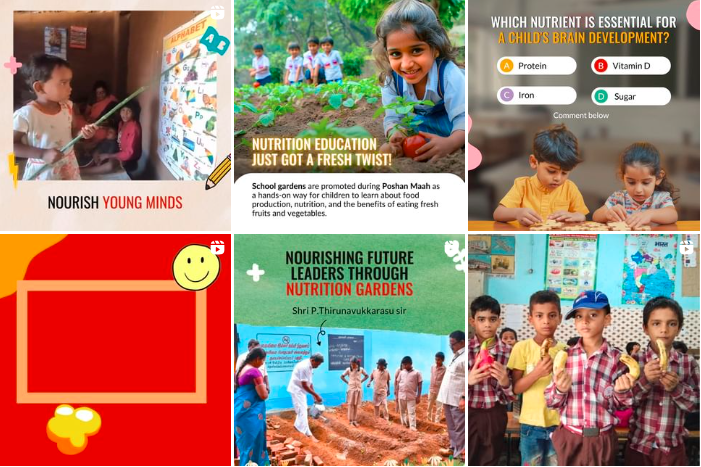POSHAN MAAH 2024
The 7th Rashtriya Poshan Maah 2024 is a nationwide initiative dedicated to combating malnutrition and promoting holistic health and nutrition. This year’s campaign, taking place throughout the month of September, focuses on several critical themes: Anaemia prevention, Growth Monitoring, Complementary Feeding, “Poshan Bhi Padhai Bhi,” Technology for Better Governance, and the environmental campaign “Ek Ped Maa Ke Naam.”
The month-long event aims to intensify efforts under the broader framework of Poshan Abhiyaan to ensure better nutrition for all, especially children, adolescents, and women. Key activities will include awareness campaigns on Exclusive Breastfeeding and Complementary Feeding, health competitions like Swasth Balak Spardha (Healthy Child Competition), and community outreach programs to encourage positive nutrition-seeking behaviors.
Efforts will be concentrated at the village, block, and district levels through identification drives, health camps, home visits, and direct community engagement. The campaign continues to align with the goals of Mission Saksham Anganwadi and Poshan 2.0, driving the country closer to the eradication of malnutrition and promoting the well-being of every individual.
Themes of Poshan Maah 2024
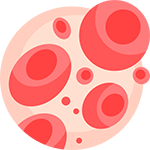
Anemia

Growth Monitoring

Complementary Feeding

Poshan Bhi Padhai Bhi

Technology for better governance, transparency, and efficiency

General Theme: Overall Nutrition
Program Details
Bal Raksha Bharat is committed to supporting the Government of India in improving the health and nutritional status of children, mothers, and adolescents, particularly in underserved communities. We focus on addressing under nutrition, promoting maternal and child health, and strengthening health systems to deliver essential nutrition and health services.
Through the POSHAN Maah initiative, Bal Raksha Bharat is contributing to nationwide efforts in addressing anemia, ensuring growth monitoring, and supporting dietary diversity.
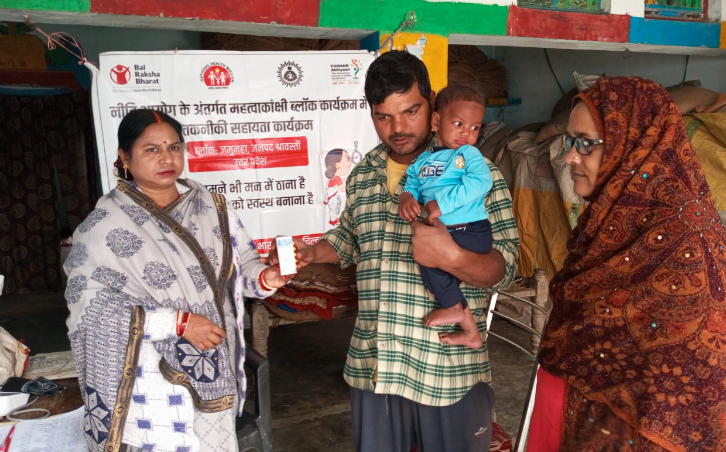
Strengthening Aspirational Block Program for Improved Nutritional Outcomes
In Jamunaha Block of Shravasti District, Uttar Pradesh
In Shravasti, the rural hinterland of the most populous state in the country, Uttar Pradesh, a poignant story unfolded. The collaborative partnership, between Department of Women & Child Development (DWCD), District Administration Shravasti and Bal Raksha Bharat, (also known as Save the Children) demonstrated a unique intervention to improve Children’s nutrition status in the block of Jamunaha, an Aspirational Block identified by NITI Aayog.
The proposed project model was conceptualized after receiving guidance from District Magistrate Shravasti and Chief Development Officer Shravasti. After a series of discussion with the relevant stakeholders and district health officials, the project model was conceptualized keeping the main objective of strengthening the coverage and quality of ICDS nutritional services and increase the reach of government services to the most marginalized families and improve the nutritional indicators.
The action plan for the project was also conceptualized having the following main points:
To extend support to the block ICDS and Block Development Officer to support the ongoing ICDS services
To undertake interventions to strengthen the existing service delivery platforms, knowledge, skills by enhancing the capacity of ICDS functionaries and front-line workers and strengthen community mobilization, beneficiary enrolment & tracking, and accountability using innovative tools
Through comprehensive training, their journey began with empowering the frontline workers – Anganwadi workers, ASHAs Sanginis, and ANMs. These unsung heroes were armed with the knowledge and tools to effectively identify and manage severe and moderate acute malnutrition cases utilizing innovative applications like Poshan Tracker and E-Kawach.
This dedication yielded remarkable results. The meticulously designed project led to an increasing number of children actively tracked from 26,179 in June 2023 to 29148 in May 2024 ensuring more children received vigilant healthcare. Most significantly, the percentage of SAM and MAM cases decreased substantially. In June 2023, SAM cases were 3.09%, but dropped to 1.20% by May 2024 through proper reporting, follow-up, and medication provision. MAM cases also fell from 7.27% to 2.71% over the same period, a remarkable nutritional status improvement.
Further, through regular meetings and collaboration with stakeholders, they fostered a culture of teamwork, enhancing program implementation and coordination. Their innovative convergence model exemplified effective cooperation among various entities, ultimately strengthening Integrated Child Development Services (ICDS) for the benefit of children. Through these meetings, the participants celebrated their achievements and documented their learnings and recommendations. Their comprehensive reports laid the groundwork for replicating their success across other districts, ensuring a lasting impact beyond Jamunaha. Thus, Jamunaha Block stood as a shining example of what collective action, dedication, and commitment could achieve for a community’s most vulnerable members.
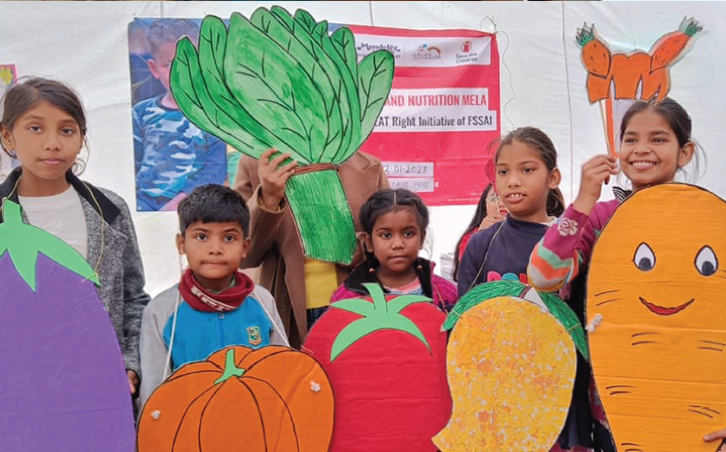
Eat Right Project:Improving Nutrition through a Multi-Sectoral Approach
Bal Raksha Bharat (BRB), in partnership with Mondelez India Foods Pvt. Ltd. and Food Safety and Standards Authority of India (FSSAI), has launched the Eat Right Schools programme, aimed at fostering a culture of safe, nutritious, and sustainable eating practices among schoolchildren. The initiative seeks to build awareness on the importance of nutrition, food safety, and hygiene in shaping the physical and cognitive development of children, thereby supporting their overall well-being.
At the heart of this programme lies the objective to transform schools into nutrition-conscious environments, where students, staff, and families collectively engage in healthy food practices. Through structured activities such as the formation of Sehat Clubs, the implementation of nutrition gardens, and food safety training (FoSTaC) for kitchen staff, BRB strives to instil long-lasting dietary habits in students.
The Eat Right Schools programme goes beyond classroom instruction, incorporating interactive and innovative Behaviour Change Communication (BCC) tools to actively engage students in health education. These tools, combined with the rigorous certification and hygiene rating of school kitchens, ensure that schools set the standard for safe food consumption, making them model institutions for promoting health and nutrition.
By creating empowered, health-conscious students, the programme aims to inspire a new generation to lead healthier lives and advocate for improved nutritional practices within their communities.
Food Safety Training (FoSTaC) and Hygiene Ratings for School Kitchens
Ensuring food safety in schools has been a priority for BRB, leading to the introduction of FoSTaC (Food Safety Training and Certification) training for kitchen handlers and a hygiene rating certification process for auditing school kitchens. This initiative supports the broader goal of certifying schools as “Eat Right Schools,” as part of the Eat Right School portal of the Food Safety and Standards Authority of India (FSSAI). The process includes comprehensive training on proper food handling, storage, kitchen layout, and personal hygiene for mid-day meal staff.
Through this program, 246 food handlers were trained, and 97 kitchens were audited, ensuring that food safety standards are consistently met across the board. The initiative has fostered a culture of continuous improvement, leading to safer, cleaner environments for preparing and consuming food. The structured audit and certification process ensures that schools adhere to high standards, reflecting BRB’s commitment to food safety and hygiene in educational institutions.
Strengthening of Sehat Clubs to Promote Healthy Habits in Schools
One of the most impactful initiatives has been the establishment and strengthening of Sehat Clubs, designed to foster a holistic approach to health education in schools. These clubs act as a dynamic platform for promoting not only physical health and hygiene but also mental well-being and nutritional education. The Sehat Clubs empower children as health advocates, where they learn and disseminate important messages on Safe and Nutritious Food (SNF) within their school environments.
Development of Nutrition Gardens in Schools
To supplement the nutrition education provided by the Sehat Clubs, BRB introduced the development of nutrition gardens within school premises. These gardens offer a sustainable and cost-effective means of enhancing dietary intake with fresh, organic ingredients grown on-site. By connecting children with nature, these gardens promote self-sufficiency, foster a sense of responsibility, and provide an engaging, therapeutic form of horticulture.
The initiative was implemented across schools in Madhya Pradesh, Himachal Pradesh, and Tamil Nadu, resulting in the development of 30 kitchen gardens. BRB partnered with the local agricultural university in Tamil Nadu to provide technical guidance, ensuring the success of the initiative.
Promoting Healthy behaviour through Interactive behaviour Change Communication (BCC) Tools
The focus on fostering health and nutrition awareness within schools has been further strengthened by the use of behaviour Change Communication (BCC) tools. BRB has implemented various communication initiatives using Information, Education, and Communication (IEC) materials. These include the development of creative and engaging resources like the “Healthy Diary,” digital wall paintings, nutrition garden books, and sun boards for School Management Committees (SMC). Key messages such as “Eat Healthy, Eat Secure, Eat Sustainable” were communicated through fruit and vegetable calendars, posters, and interactive games
Key Highlights: The project has been a collaborative endeavor, bringing together a multitude of stakeholders. Its objectives were multi-faceted, including:
- Improving the knowledge, attitudes, and practices of communities while
- strengthening systems to deliver nutritious food.
- This initiative also supported the implementation approaches under the Rashtriya Bal Swasthya Karyakram program in schools
- Aiming to provide a replicable, cost-effective, and sustainable model for a “safe and nutritious food program in schools.
Some significant milestones have already been achieved through this incredible collaboration with FSSAI and Mondelez:
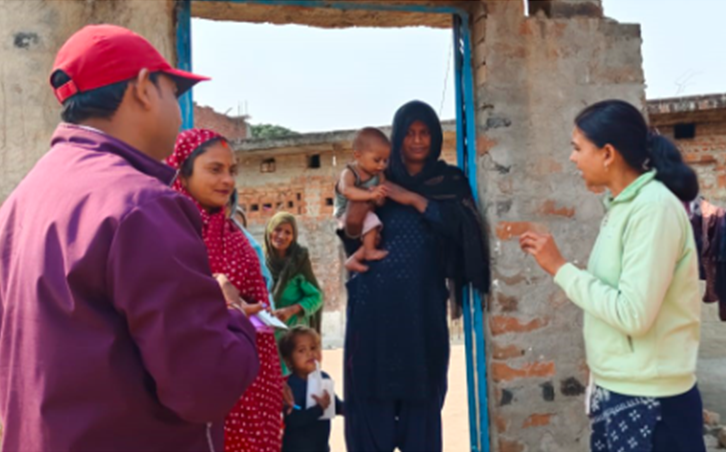
Improving Nutrition through a Multi-Sectoral Approach in Urban Slums of Mumbai’s N-Ward
Bal Raksha Bharat and K-Corp Charitable Foundation partnered on its commitment to addressing under-nutrition and improving child health in vulnerable communities through its project, “Improving Nutrition through a Multi-Sectoral Approach in Urban Slums of N-Ward, Mumbai Suburban District, Maharashtra.” The project aims to enhance the nutritional status of children under two years of age by delivering comprehensive nutrition actions at scale.
This initiative integrates various sectors, including health, Integrated Child Development Services (ICDS), and Water, Sanitation, and Hygiene (WASH), ensuring a holistic and sustainable approach to combating under-nutrition. By strengthening existing government services, the project seeks to create lasting change in the lives of children living in some of Mumbai’s most disadvantaged urban areas.
The central objective of this project is to reduce the prevalence of underweight and wasting among children under two years of age, building upon baseline data to track improvements. In pursuit of this goal, the project has set ambitious targets, which include ensuring that at least 80% of the households in the targeted urban slums receive quality, nutrition-specific interventions. This initiative also focuses on equipping caregivers with optimal knowledge of Infant and Young Child Feeding (IYCF) practices, emphasizing the importance of dietary diversity and meal frequency. By fostering awareness and behavioural change among caregivers, the project ensures that children receive the necessary nutritional support during their crucial developmental years.
The project operates through a range of carefully designed interventions. In collaboration with the ICDS and the Health Department of N-Ward, Ghatkopar, Bal Raksha Bharat delivers services that aim to improve both maternal and child health outcomes.
You can explore our digital content for Rashtriya Poshan Maah 2024 by visiting our social media platforms.
Click the link to stay updated and engage with our initiatives.






